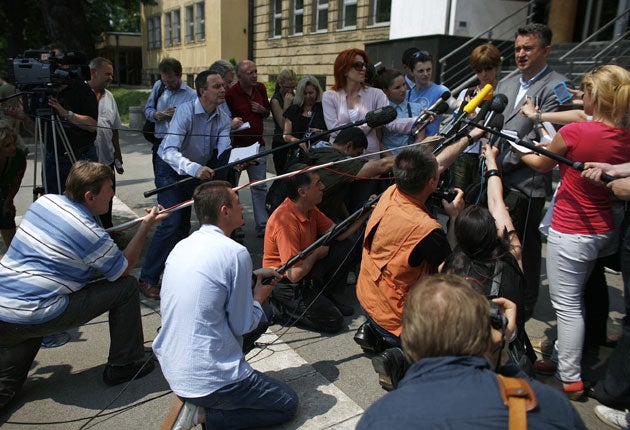Belgrade braced for protests as Mladic tries to buy time
Family of former Bosnian Serb military commander say he needs 'rest' before he can be extradited to The Hague

Close surveillance of suspected helpers and family members led to the capture of Ratko Mladic after 16 years on the run, an official close to his arrest said yesterday.
Security staff monitoring the communications of known Mladic helpers had discovered several weeks ago which family members were helping the fugitive general who has been indicted for genocide during the Bosnian war between 1992 and 1995.
Mladic, 69, was found on Thursday at a farmhouse belonging to his cousin after years of failed attempts to capture him. He is currently being held in a Serbian jail, but could be extradited to The Hague as early as tomorrow if a judge rejects his appeal against the decision to move him. His defence team and family say he has several, unspecified, health problems.
Ivica Dacic, Serbia's police chief, said security has been tightened throughout the country in the run-up to a protest by ultranationalists, scheduled to take place in Belgrade today, over Mladic's arrest on Thursday after 16 years on the run.
According to Mladic's lawyer, Milos Saljic, Mladic has made "a public appeal" against violence. "He is calling for there to be no bloodshed," Mr Saljic told reporters after meeting Mladic in his prison cell. "He does not want to be the cause of unrest." Mladic is charged for his part in the killing of some 8,000 Bosnian Muslim men and boys in Srebrenica, and for other atrocities committed by his troops during Bosnia's 1992-95 war.
There are fears of violence, as extreme right-wing groups are calling on their supporters to join today's rally organised by the Serbian Radical Party. "Additional attention has been focused on the extremist groups these days," Mr Dacic said. "We are taking measures to prevent the escalation of extremist behaviour."
Mladic's son, Darko, told reporters yesterday that the former fugitive seemed unaware of the situation he faces. "If you were able to talk to him for five minutes, you would know what I'm talking about," he said, appealing for his father to be allowed to go to hospital. He also repeated his father's call to avoid violence.
Meanwhile, up to 2,000 Muslim Bosniaks converged on the eastern Bosnian town of Visegrad yesterday to remember friends and relatives killed there by forces led by Mladic at the start of the war. They arrived on buses to throw roses into the Drina River, which divides Bosnia from Serbia. People from Visegrad who were expelled in 1992 gather every year to commemorate their dead.
"My house is some 200 metres away from here. It is always hard for me to be here, especially when I am standing on this bridge which in 1992 was covered with Bosniak blood," said Bakira Hasecic, a victim of a campaign of mass rape by Bosnian Serbs in wartime Visegrad.
Adila Semdo, whose two brothers-in-law and father-in-law were killed in Visegrad in 1992, said the arrest of Mladic came too late. "Maybe it would have meant something if he had been arrested 15 years ago when he could have told us why, why he did this, but not any more."
Thousands of civilians from the area around Visegrad were rounded up and killed by Mladic's troops at the beginning of the Bosnian war, and scores of non-Serb women were imprisoned and raped. Bodies of hundreds of victims were dumped into the Drina from the Ottoman-era bridge in Visegrad or buried in mass graves around the town. Members of the Serbian anti-war group Women in Black joined yesterday's commemoration ceremonies in Visegrad.
Join our commenting forum
Join thought-provoking conversations, follow other Independent readers and see their replies
Comments
Bookmark popover
Removed from bookmarks